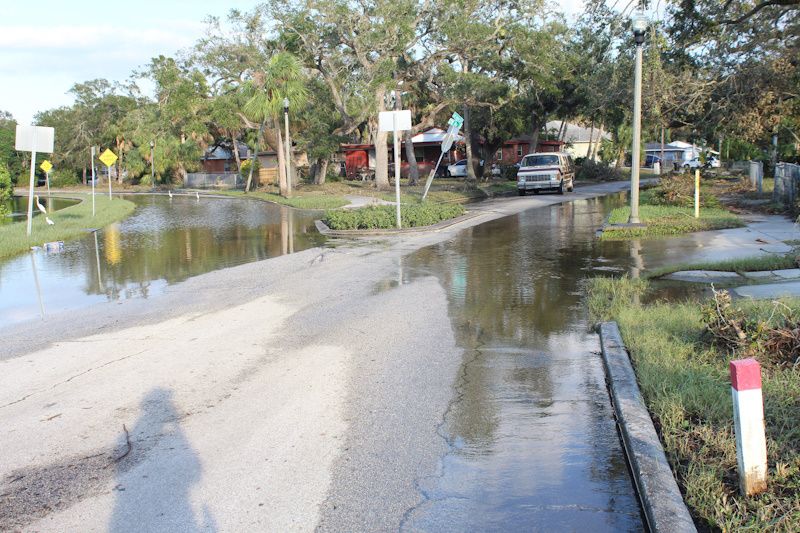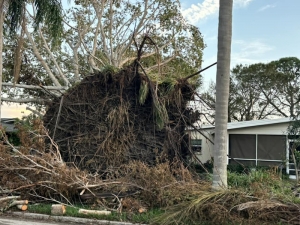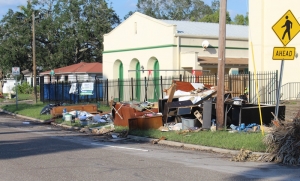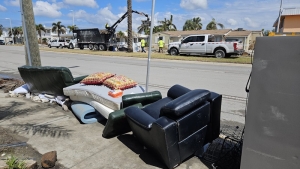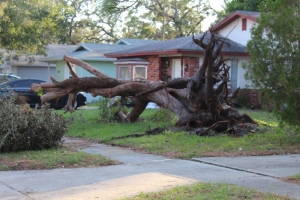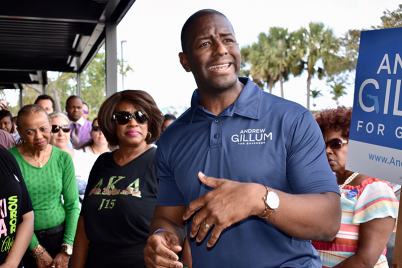By J.A. Jones, Staff Writer
TAMPA BAY – Nonprofit leader Bridgette Heller said she always believed the science behind climate change assertions. Hearing experts describe how Milton was strengthened by the warm waters in the Gulf of Mexico improved her understanding of the science. “Importantly for me, I was able to watch firsthand the path of recovery and relief following the hurricane,” she shared.
But she also wondered about the depth of impact on the south St. Petersburg community and barrier islands, and whether the apparent imbalance in damage was based on systemic inequities in both infrastructure and prioritization of recovery efforts.
The Rev. Russell Meyer noted, “Helene/Milton may register on the 100-year scale, but we will see more like them. Hurricanes have doubled in number in the last decade.”
Noting that Tampa Bay is one of the most vulnerable environments in the country, he added “We must stop denying the impacts of sea level rise on our lives in our time. As a political-economic system, Tampa Bay simply is not prepared, nor is it properly preparing.”
Local digital and tech leader Veatrice Farrell mused whether calling it something else might help people pay attention, noting “Despite our insignificance in the entire universe, overusing natural resources impacts how nature responds, she’s trying to get our attention!”
Dr. Christy Foust, a local organizer for a statewide justice organization, affirmed that predictions associated with climate change “are coming true. And have been coming true. Scientists have been right for decades,” she shared, adding that the consequence of leaders ignoring those scientists is now “bearing fruit.”
Educator and nature activist Dr. Hillary Van Dyke wrote, “What I hope St Pete learns from Helene and Milton is that Mother Nature is eventually going to win this battle. Rather than work against the natural environment, why don’t we work with it to mitigate post-storm issues such as flooding?”
Van Dyke mentioned the recent trend of “overdevelopment of concrete and skyscraper hellscapes” and petitioned for equal improvements to the natural environment, including planting mangroves and living shorelines rather than concrete sea walls.
Filmmaker and activist Jabaar Edmond noted that as a statewide climate justice organizer he’s seen the most fragile communities exposed to many environmental justice issues.
“From refineries in community neighborhoods to millions of gallons of untreated or partially treated sewage dumped into the bay, we have a responsibility to the environment,” he shared. Recovery, he noted, is not just about damage to property, but the accompanying stress and anxiety the storms have brought.
Writer and artist Tenea D. Johnson responded that as author of dystopian speculative fiction and social commentary, the recent storms have only exemplified what she already thought about climate change.
“Having studied the science for years and extrapolated the outcomes, I’ll say though I wish it were not true: this is just the beginning. For now, we still have some say in how it ends,” she added.
Martial arts instructor Walter Evans said as someone who was raised around beaches, there was a time when one had to walk much further to the shorelines – but today, the beach is within a fifteen-minute walk in some neighborhoods.“Climate change is real,” he insisted, sharing his passion for recycling as a way to support the environment.
An avid urban gardener who instructs youth at Artz 4 Life in Clearwater on planting in their center’s community garden, Evans recommends gardening for spiritual and mental health as well. “It’s a mental break from all the chaos in the world – whether it’s hurricanes or politics.”
River Hayward, a 22-year-old videographer from Clearwater, used the analogy of a landscaper who must care for the trees, trimming to help strengthen them as they grow. He noted that the goal was to ensure their health, rather than just chopping off limbs when problems occur.
Or, in the case of Helene and Milton, after they’re destroyed by a storm.
“We have to think about climate, know that it’s happening now, so that every little thing we do, we have to be proactive,” noted the Gen Z media enthusiast. “We should be setting up the earth for sustainability.”

